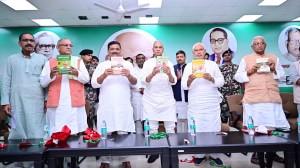Residents welcome ban on polybags
SHIMLA, January 5: The Himachal Government's decision to ban recycled coloured polythene bags is seen as a pioneering step to save people...

SHIMLA, January 5: The Himachal Government’s decision to ban recycled coloured polythene bags is seen as a pioneering step to save people and the environment from its hazardous effects. The residents of Shimla have more than one reason to welcome the ban, as this would also result in keeping the hills clean and green. The residents, however, suggest greater involvement of people in the implementation of the ban, provision of alternatives to polythene bags and strengthening the system for their collection.
Speaking to The Indian Express, people from all walks of life — professionals, educationists, traders, housewives and social activists welcomed the government’s decision. "Plastic bags must go completely. These are toxic and hazardous. People must be educated about the adverse effects of plastic on health and environment" said Abhilasha Kumari, a practising lawyer of the Himachal Pradesh High Court. She suggested that the government should go in for a phased banning of all types of polythene bags and for ensuring that people voluntarily kicked the use of polythene bags. Moreover, the system of collection and disposal should also be strengthened, the lawyer said.
Harvinder Singh, Shimla’s leading photographer felt that "the ban was long overdue." Singh said that the chemicals used in recycled bags were most hazardous and harmful. However, in foreign countries recycling of plastic was being encouraged because chemicals used in the process were safe there. Every product made from recycled waste also specifies as to how many times has it been recycled. Things, however, are not the same in India, as the recycling industry has been using hazardous materials and harmful chemicals in the manufacture of coloured bags.
A. K. Viz, an engineer and former president of the Rotary Club, Shimla, while hailing the ban, said that the government should adopt a step-by-step approach in completely eliminating polythene bags from Shimla. He added that alternatives should be provided and there should be greater awareness. He added that new ways should be devised for its disposal.
Beopar Mandal president Ashok Khanna pledged total support to the government for enforcing the ban, covering all types of polythene bags in stages. "First of all the government should remove the confusion as to which types of bags were exempted from the ban and which were included. The next step should be to provide alternatives like jute bags" he added. Khanna said that the government should not be strict at the initial stage, while adding that it should allow traders and retailers to use the existing stocks and that the ban should slowly cover all types of bags coloured as well as transparent ones.
Sunaina Arya, a house-wife, said that volunteers should undertake door-to-door visits and educate housewives and families on the need for the ban. She suggested that the ban should cover all types of polythene bags, while adding that a proper system should be introduced for the collection of these bags.
N. K. Sharma, a retired university professor recalls the days when Shimla used to be clean and its slopes free from the menace of coloured polybags, that now are littered all around. "The decision on the ban is right and people should be involved in enforcing the decision," he said. Sharma said that the success of the ban would largely depend on public cooperation rather than through strictures.
Sandeep Khurana, a tourist from Delhi, said that he found "Shimla much cleaner this time. This must be the result of the ban," he observed. "It is good that Himachal Pradesh has taken a lead in this pioneering effort and has showed the nation a way," he added.
Rama Kanwar, a school teacher said that the people should be educated on the long-term hazardous effects of polythene on human health. There was no harm, if a chapter on polythene was introduced in school textbooks to educate children on the subject.
V. P. Sood, a retired Army officer who runs a travel agency demanded that the government should provide alternatives so that people discarded polythene bags.



- 01
- 02
- 03
- 04
- 05



























